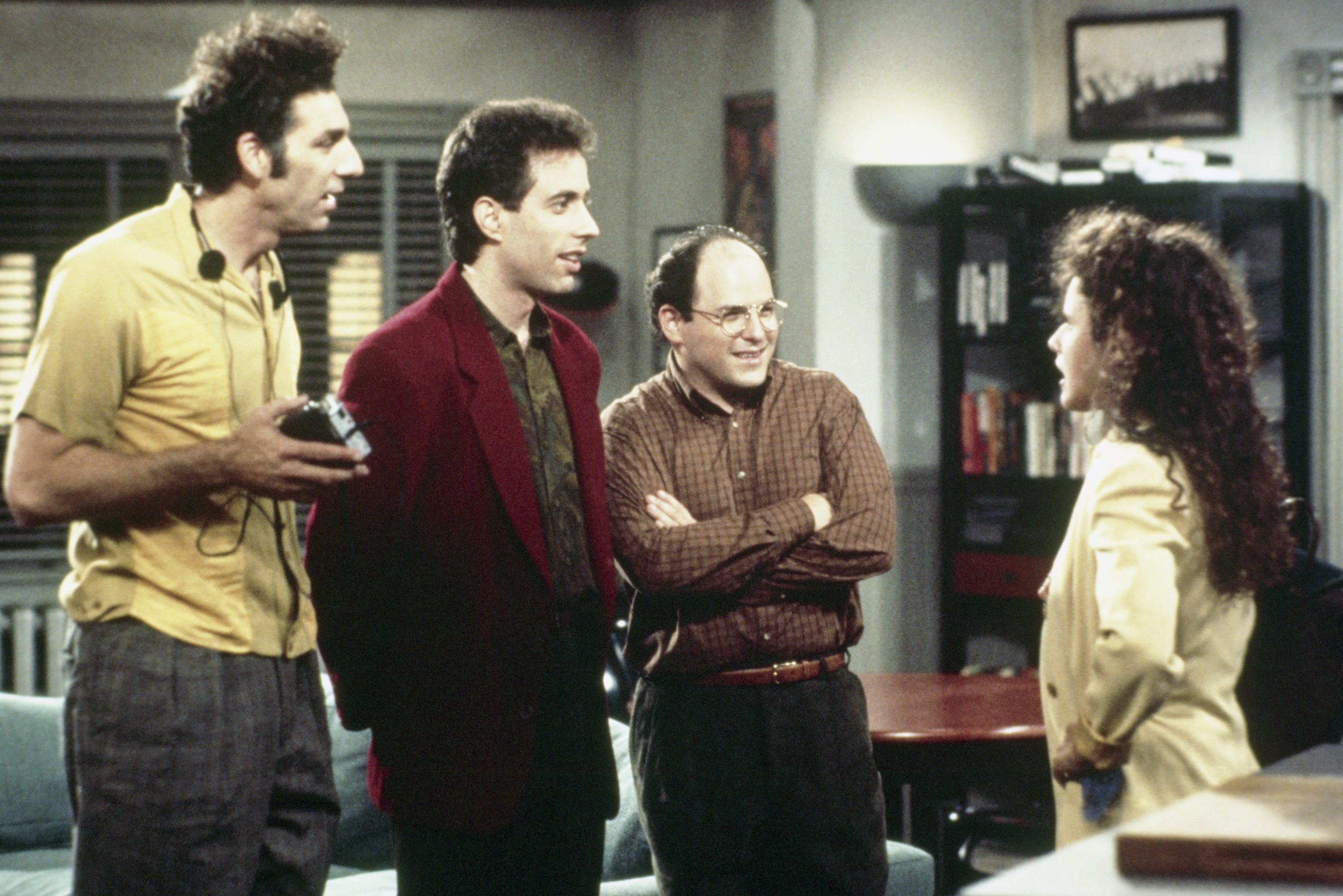According to the Joyce Word Dictionary (JWD), James Joyce invented thousands of words and phrases while writing iconic works like Dubliners, Finnegans Wake, Ulysses and A Portrait of the Artist as a Young Man.
While they didn’t reach the thousands, the writers of Seinfeld did introduce a number of memorable words and phrases that became a core part of the show’s nine-year run on NBC as well as our pop culture vernacular.
“They gave us funny ways of talking about things that didn’t have words or phrases before,” Jennifer Armstrong, the bestselling author of Seinfeldia, told RealClearLife. “People also just love to find like-minded others among strangers, and Seinfeld phrases help them do that. Jerry [Seinfeld] and Larry [David] are word people. The language, in addition to being quotable, is quite musical. It’s just the way that they write. If you watch Curb, you can hear the similarities.”
And, though the show’s run officially ended 20 years ago today when “The Finale Part 2” debuted in May of 1998, Seinlanguage, at least in some circles and Slack channels, is still used on a daily basis.
“The show is about the massive tiny irritations of everyday life, so we all relate to it. And it gave us ways to talk about these weird things that come up—’shrinkage,’ ‘sponge worthy’—so we can keep going back to those phrases as part of our way to talk about everyday life,” Armstrong said. “Technology hasn’t really made life less irritating, so we still relate, even if life is different now. We use phrases all the time from the show, and many younger people don’t know that they’re from a specific television show. They’re just part of the lexicon.”
To mark the 20th anniversary of the end of Seinfeld and pressure Webster’s to make some additions, we’ve collected and defined 20 top words and phrases the show popularized.
They might not all be real, but they’re spectacular.
1) Low-talker: An individual whose voice is low in pitch it can be difficult to understand what they are saying even at close range. Can lead to big breakdowns in communication and agreeing to wear strange garments.
2) Close-talker: An individual who unknowingly violates another person’s personal space during normal conversation for no apparent reason.
3) High-talker: A man whose voice is so high in pitch it can easily be confused with the voice of a woman during conversation over the phone.
4) Double-dip: The act of taking an item of food like a chip or cracker, dipping it into a sauce or soft cheese, taking a bite, and then dipping again. It’s like putting your whole mouth right in the dip.
5) Sponge-worthy: A potential male sexual partner who is deemed attractive and successful enough that they are worth using up one of a limited supply of contraceptive sponges to sleep with.
6) Jimmy legs: Legs that move restlessly during sleep and make it difficult for a partner fall asleep. Can lead to couples sleeping in separate beds.
7) Man hands: Strong, muscular hands on a woman that would seem more normally suited to a man.
8) Master of your domain: An individual who is in control of their natural urge to masturbate and refrains from doing it is a master of their domain. Queen of the castle is an equivalent phrase.
9) Anti-dentite: A person who is irrationally biased against all dentists and dental culture.
10) No soup for you: First said by the Soup Nazi, the phrase can be used to literally deny soup to someone as well as reject any request in general.
11) Two-face: A person whose physical appearance can look attractive one monent and then unattractive the next without any clear reason for the change.
12) Shrinkage: The way a man’s genitals shrink “like a frightened turtle” after he goes in cold water in a pool or the ocean.
13) Stopping short: While driving, when a man intentionally hits the brakes so that his female passenger shoots forward in her seat and he has a reason to use his hand to prevent her from striking the windshield. Stopping short with another man’s wife is uncouth.
14) Regifting: Giving a present you don’t like or need to someone else as a gift and behaving as if you got it for them on purpose.
15) Not that there’s anything wrong with that: Originally used when Jerry and George reasserted their heterosexuality after being misidentified as a gay couple. The phrase can be used to indicate an acceptance of any lifestyle.
16) Serenity now: A phrase, best shouted or repeated over and over, to help remind its speaker that they should relax and calm down. Often ineffective.
17) Yadda, yadda, yadda: Not a Seinfeld original, this phrase is used to gloss over mundane details during a story. In the context of the show, it can be used to gloss over major details like going to prison or having sex.
18) Pop-in: An individual showing up at another person’s home without calling or otherwise alerting the resident they were going to be stopping by.
19) In the vault: A non-physical place in an individual where they will place a sensitive piece of information and keep it safe without repeating it. Can be unlocked by alcohol.
20) Mimbo: A good-looking man one might date for superficial reasons. A male bimbo.
This article appeared in an InsideHook newsletter. Sign up for free to get more on travel, wellness, style, drinking, and culture.
